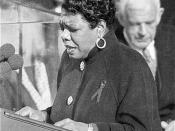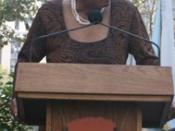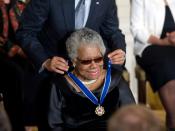Some would argue that only a select few can become doctors, politicians, and professional elites. That people are born with this fate. One cannot become president of the United States, simply because of mere desire. People are different. They can only live in the un-opposable flow of life. Not Maya Angelou. In her story about fighting destiny, "What's Your Name Girl?", she discovers that despite her born identity, she does not have to sit by and watch her life pass her by. The power to believe in one's self is the power to change fate. Though shaped by gender, race and age, she finds that her destiny is something that can be crafted and controlled.
Angelou's birthrights did not include learning to participate in what was considered some of life's finer nuances. Angelou was born into a poor southern town. Though not "poverty-stricken, or just munching along on a few of life's necessities, [she was] given as extensive and irrelevant preparations for adulthood as rich white girls shown in magazines...While
white girls learned to waltz...[she was] lagging behind" (74). She "mastered the art of crocheting and tatting...but the finer touches around the home, like setting a table with real silver, baking roasts, and cooking vegetables without meat, had to be learned elsewhere. Usually at the source of those habits" (74). In order to learn these finer skills, she had to go to work in the kitchen of a rich white woman's house. This supposedly was the only way to get this kind of training. In her time, perhaps this was one of the few jobs that a black woman could get, or hope to get. So Mrs. Viola Cullinan takes her under her wing.
To Mrs. Cullinan, Maya is no different than the slaves that worked for her...



Oh no.... referencing?
You've included reference numbers, but no bibliography.... please when you read this comment, include your bibliography in a comment - otherwise referencing here was a waste of time! Otherwise a strong essay.
2 out of 4 people found this comment useful.